It’s the first day of shooting on Open Five, Memphis
filmmaker Kentucker Audley’s third feature film, and sound guys Sean
Faust and Kent Smith are having a problem.
Smith is trying to attach remote microphones to actresses Shannon
Esper and Genevieve Angelson, but he’s run into a hitch.
“She’s wearing loose clothing,” Faust says to Smith, confused about
why he seems at an impasse.
“I don’t know where to hook it,” Smith says.
“You let her hook it,” Faust says.
“I’m not wearing anything,” Angelson pipes in helpfully.
“Nothing?”
Angelson shakes her head.
“No brassiere?” Faust asks, and Angelson shakes her head again.
“Oh, my. Then I guess we need more ace bandages.”
Troubleshooting is a theme on this first day, in which Audley and a
10-person cast and crew are trying to get a handful of crucial shots at
the Memphis International Airport without drawing too much attention to
themselves.
Audley’s films — such as his Indie Memphis-winning
Team Picture, which went on to screen at the Harvard Film
Archives and the IFC Center in New York, among other places, and got
him tabbed a “new face of independent film” by Moviemaker
magazine — are largely improvised and rooted in real
experiences. He wants authentic, potentially volatile situations, but
shooting in a vast, crowded public space is a new challenge.
Uncontrolled environments, Audley says at the shoot, are “normal for
the kinds of movies I make, but maybe not this uncontrolled.”
The film, co-written (or perhaps co-conceived) with Jump Back Jake
singer Jake Rabinbach, depicts two young women from New York visiting
Memphis for the weekend who are escorted around town by Rabinbach and
Audley, playing fictionalized versions of themselves. Another scene on
the first — and, Audley later says, most hectic — day of
the 12-day shoot is of Rabinbach picking the women up outside baggage
claim, maneuvering his van through a minefield of honking old ladies,
suitcase-dragging travelers, and a whistle-blowing crossing guard for
multiple takes while Audley stalks hurriedly along the drop-off lane.
After this, the crew is happy to move on to more serene locations such
as the P&H Café, the banks of the Mississippi, and even the
candlelight vigil at Graceland.
On the same day that Audley and his crew launched Open Five,
director David Harris, producer Erin Hagee, and their crew began
shooting Savage County, a web-based horror series financed by
Harris’ employer, MTV New Media, created through Craig Brewer’s BR2
Productions, and featuring many of the cast and crew of Brewer’s MTV
web series $5 Cover (for which the L.A.-based Harris and
Memphian Hagee were both producers).
A couple of weeks later, in the final days of an 18-day shoot
featuring long nights, oppressive heat, and, in the words of assistant
director Morgan Jon Fox, “animal- and insect-infested locations,” the
Savage County crew is filming some particularly nasty business
at Parker Prints, an enormous, multi-story brick print shop on Willie
Mitchell Boulevard in South Memphis. Property master Darian Corley and
her assistants have fashioned a portion of the building’s bottom floor
into a torture chamber of sorts, where actress Melissa Carnell is
chained to a chair and preparing to be branded with a hot iron.
“Bloody murder scream or whimpering?” Carnell asks into her
microphone, as Harris, Corley, and Fox watch the shot on a monitor at
the opposite end of the dark, concrete room. “Bloody murder scream,”
Harris instructs.
Watching the scene on the monitor, a layer of Carnell’s fake skin
seems to melt and peels off with the branding iron. The assembled crew
members recoil with a mix of horror and glee and a collective,
involuntary “wha-ha-ha.”
“That was horrible,” Harris says with a smile. “There’s our R.”
Open Five and Savage County are not the only projects
that have been filmed around town lately. Documentary filmmaker Willy
Bearden has made a foray into narrative fiction with the period piece
One Came Home; director Brad Ellis and his Old School Pictures
crew will finish shooting their visually ambitious and highly promising
vampire drama Daylight Fades early next month; filmmaking trio
Corduroy Wednesday continues work on their ongoing web series The
Conversion; and many small projects are no doubt being filmed for
Live From Memphis’ L’il Film Fest and Music Video Showcase,
respectively.
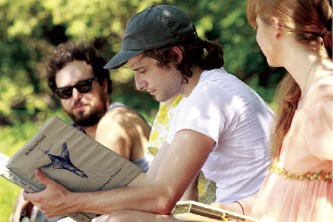 Justin Fox Burks
Justin Fox Burks
director Kentucker Audley
But these ostensibly different projects — one, Open
Five, an intimate, realistic feature likely to make the festival
circuit (and potentially a theatrical run) before a DVD release, the
other, Savage County, an effects-based genre series destined for
the web (and possibly television) — have two things in
common that are emblematic of the evolution of the Memphis indie scene:
Each represents a significant collaboration between homegrown
filmmakers and outside artists, and each has a realistic hope of
finding an audience beyond a handful of local family-and-friends
screenings.
Writer/director Harris shot a pilot episode for Savage County
— which is set in a small Texas town — in March
in Los Angeles, a month before $5 Cover launched. Once MTV
approved the series, Harris considered setting up his production
(budgeted at roughly $250,000) in film hotbed Austin but realized, he
says, that he was “trying to replicate the $5 Cover crew, which
was already in place.”
Teaming up with Brewer’s BR2 Productions for a Memphis shoot, Harris
brought in part of the crew from Los Angeles — an assistant
director, a cinematographer, a makeup specialist, etc. — while
longtime Brewer assistant Hagee assembled a Memphis contingent that is
something of a “getting the band back together” moment for the $5
Cover team: Local filmmakers Fox and Mike McCarthy returning in
their assistant director and script supervisor roles, with property
master Corley (a Los Angeles-based Memphis native who worked on the
pilot) and costumer Meriwether Nichols, among others, back as well.
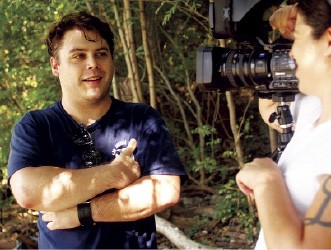 Justin Fox Burks
Justin Fox Burks
producer Nick Case
“We start in the world of teen movies and end up in Texas
Chainsaw Massacre,” Harris says, explaining Savage County‘s
plot like this: “Kids in small-town Texas are bored on the last weekend
before school. They pull a prank on an old man and end up killing him,
and his murderous kin come to set things right.”
Five of the seven lead teen characters are played by Los Angeles
actors, with the other two Memphians drawn from the latest films by Fox
(Ryan Carter from OMG/HaHaHa) and McCarthy (Ivey McLemore from
the upcoming Cigarette Girl). The heavies, though, are all
Memphians. Among the “murderous kin” are $5 Cover‘s Jeff Pope,
mammoth local film regular Patrick Cox, and puppeteer Jimmy Crosthwait,
cast after Harris saw him alongside Cody Dickinson in one of $5
Cover‘s documentary companion films.
“We’ve got a good mix,” Harris says of the blend of Hollywood and
Memphis talent on the set. “We were on a pretty tight timeline, but
everything’s coming together.”
“It’s just been a rush to jump in and make it great,” Hagee
says.
As for Audley, his collaborations on Open Five extend beyond
creative partner and co-star Rabinbach. On the other side of the
camera, Chicago filmmaker Joe Swanberg — one of the leading
figures in the recent indie “mumblecore” scene via films such as
Hannah Takes the Stairs and Kissing on the Mouth —
came in to act as the film’s primary cameraman, bringing with him his
own frequent partner, Dallas filmmaker David Lowery.
Audley, whose debut, Team Picture, found itself screening at
various festivals and exhibitions, befriended Swanberg after sending
him an early copy of the film. The pair soon collaborated on the short
film Ginger Sand, a Chicago-set coda to Team Picture.
“I try to keep myself out of the preparation stages as much as
possible so that people can bring their own things into it,” Audley
says of working with Swanberg and Lowery on the film.
The result, says Audley, “went unexpectedly, which is what I wanted.
I set it up so that things that I couldn’t imagine would happen
happened. Not extraordinary things. But little interactions I hadn’t
dreamed of.”
In addition to collaborating with well-regarded outside filmmakers,
Audley signed on to work with producers Nick Case and Ryan Watt, a
young duo who recently started the company Paper Moon Films with the
goal of producing local independent films. Open Five is their
first joint project.
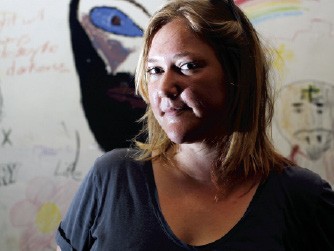 Justin Fox Burks
Justin Fox Burks
producer Erin Hagee
“It was a completely new team,” Audley says. “Nick
got in touch with me awhile back, and I had seen a couple of things
he had worked on which I was interested in. He could do what I always
needed — legal things, logistics — all the stuff I’m not
interested in working on. I think we understand each other. He gets the
work, and I get his sensibility.”
A Memphis native who got his start as a production assistant on the
Memphis-shot 21 Grams while still a student at Ole Miss, Case
set out for Los Angeles soon after and hustled his way into production
assistant jobs, eventually meeting filmmaker Cam Archer. Case served as
one of the producers on Archer’s experimental indie Wild Tigers I
Have Known (filmmaker Gus Van Sant was the executive producer),
which premiered at Sundance and went on to win an Independent Spirit
Award.
Case is also a producer on Archer’s follow-up, Shit Year,
which stars Ellen Barkin. And he worked as a production manager on
actor Leonardo DiCaprio’s environmental documentary The 11th
Hour, which was shot using members of Martin Scorsese’s regular
crew.
When his Los Angeles apartment lease was up, Case decided to return
home for a while and was surprised at the film scene he found.
“I was shocked,” Case says. “I knew Morgan [Jon Fox], and certainly
Craig [Brewer] and Ira [Sachs] but wasn’t aware of how much was going
on.”
In getting to know people involved in Memphis films, Case began to
see a potential role for himself.
“What I found when I started talking to these filmmakers was that
the idea of a producer who could be involved fulltime, who wasn’t just
an investor, was intriguing to them. These guys had been doing it all
themselves,” he says.
Case got involved with Audley on the back end of his second feature,
The Holy Land, which is now finished and getting ready for fall
festival submissions. Meanwhile, Case’s high school friend Watt had
also stumbled into the film scene.
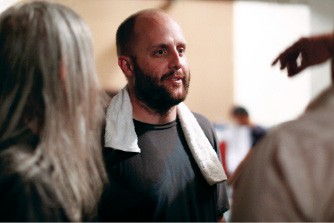 Justin Fox Burks
Justin Fox Burks
director David Harris
A marketing entrepreneur by trade, Watt had known filmmakers Brad
Ellis and Allen Gardner since high school and became involved with
their Indie Memphis winner Act One. When Ellis and Gardner got
ready to shoot their vampire flick Daylight Fades, Watt signed
on as a producer.
“I got involved as a producer first to invest and raise money,” Watt
says. “I thought I might show up occasionally, and it would be fun. I
ended up on the set every day.”
“I think they’re providing a service that the local film scene needs
whether [the film scene] knows it or not,” says Indie Memphis director
Erik Jambor, who helped connect Case with Paper Moon’s next project,
The Romance of Loneliness, the feature debut from local
filmmaking team Sarah Ledbetter and Matteo Servente. (Jambor will also
be screening Swanberg’s and Lowery’s current films — Alexander
the Last and St. Nick — at the October festival.)
“It’s good to get people off the idea that they have to do
everything themselves,” Jambor says. “[Producing] is not just about
finding funding, but helping to develop writer/directors into artists
who can grow. If you look at the indie film world, that’s where a lot
of the most interesting stuff comes from.”
The kind of collaboration that Open Five and Savage
County represents is something Jambor has promoted since taking the
helm of Indie Memphis a year and a half ago.
“A lot of what we do is centered on connecting people,” says Jambor,
whose festival was recently named by Filmmaker magazine as one
of the world’s 25 Coolest Film Festivals. “We’re always looking for way
to make these connections happen, and we think that’s a necessary step
to expand the notion of regional filmmaking. As an artist, you can’t be
working in a bubble.”
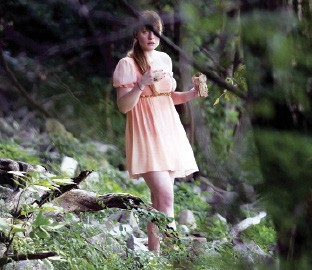 Justin Fox Burks
Justin Fox Burks
Genevieve Angelson in ‘Open Five’
Defining the producer’s role is another sign of the increased
seriousness and the realistic ambitions driving the growth of local
filmmaking.
“Once the film’s done, we’re just getting started,” Case says about
the distribution options facing indie films in an age of declining
theatrical opportunities. “The distribution world is changing so much.
Those big Sundance buys? They’re not happening. It’s going to be about
self-distribution. Online. TV and TV On Demand. Some people are taking
their films on the road like a rock band — delivering the product
directly to the audience.”
The range of Memphis filmmakers taking advantage of these
alternative distribution models to reach audiences beyond local film
scenesters is growing. It’s no longer just about Brewer, Sachs, and
McCarthy, though McCarthy will make a splash next month when he unveils
Cigarette Girl, his first feature since 2000’s Superstarlet
A.D., which debuted in July before a large audience at the
Revelation Perth International Film Festival in Australia and looks to
expand the “exploitation” director’s devoted cult.
“I’ve got enough street cred. I’ve got gravel-road cred,” McCarthy
says, citing Cigarette Girl as a film he hopes will be taken
more seriously.
This summer, Fox joined past honorees Audley and Brewer as a
Memphis-based member of Moviemaker‘s annual “new faces of indie
film” list, and after a strong festival run, his most recent feature,
OMG/HaHaHa, will get a fall DVD release from venerable art-film
distributor Water Bearer Films. Filmmakers such as Jeremy Benson
(Live Animals), Brian Pera (The Way I See Things), and
Rod Pitts (What Goes Around …) have joined an expanding list
of local filmmakers to garner good festival screenings and demonstrate
an ability to produce even better work in the future.
Many filmmakers also are following the $5 Cover lead in
exploring the web as a means of bringing their work directly to
audiences rather than wade through the morass of festival submissions.
Like $5 Cover and Savage County, these attempts have been
through serialized content. Filmmaker Mark Jones (Eli Parker Is
Getting Married?, Fraternity Massacre on Hell Island)
lovingly spoofed daytime soap operas with his On the Edge of
Happiness series, which recently screened at the North Carolina Gay
& Lesbian Film Festival after debuting online.
“I was a little disappointed in not getting into a ton of festivals
for Eli Parker and Fraternity Massacre,” Jones says. “So
I wanted to be more in control of getting my work out there.”
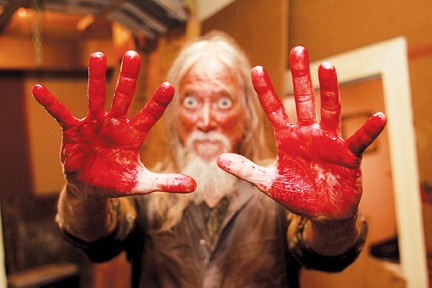 Justin Fox Burks
Justin Fox Burks
Memphis puppeteer Jimmy Crosthwait in ‘Savage County’
More recently, emerging filmmaking trio Corduroy Wednesday has gone
the web route with their ongoing conspiracy series The
Conversion, an inventive techno-thriller inspired by the move from
analog to digital television.
“We liked the idea of doing something on the web and getting it out
to people and getting immediate feedback,” says Corduroy Wednesday
writer/director Edward Valibus Phillips. “It’s not just one screening
in one theater and one city. Now if somebody sees it and likes it, they
can say, hey people check this out, and it’s available 24/7.”
Phillips and collaborators Erik Morrison and Benjamin Rednour
financed The Conversion via a lucrative win (roughly $1,500) for
their short film CottonBallLand at a recent installment of Live
From Memphis’ L’il Film Fest, a quarterly contest and showcase that has
returned from hiatus to inspire and help develop local filmmakers.
“That’s what keeps us in practice,” Phillips says of the L’il Film
Fest, especially when we aren’t working on a huge project.”
A 12-part series, The Conversion will continue to debut new
episodes through September, with the final stretch playing as part of a
full screening at Indie Memphis in October.
Many see the growth of web-based content as something Memphis can
capitalize on, something Brewer stressed when $5 Cover debuted
earlier this year.
“This is a town with creative people who can make a dollar go a long
way,” Harris says.
“I think the new media will be great for Memphis,” says Corley, who
says a lot of her recent work in Los Angeles has been for web-based
content. “More and more content is needed and there are people here who
know how to do it. I think $5 Cover was great for Memphis, and
[Savage County] coming here is the proof of that.”
If the Memphis filmmaking scene is entering a new, more diverse, and
more serious phase, the Savage County shoot is a reminder of why
so many are drawn to filmmaking despite the heavy odds against
lucrative success: It’s about as close as you can get to hard work as
creative play.
Back at Parker Prints, Corley is showing off a set filled with
gruesome gadgets: a chair with chains that tips, suspended, over a
lawnmower blade; a hook for hanging brave actors upside down; a wall
rack where victims are tied up, spread-eagle.
“What’s great about a production like this is that everyone in the
art department is local, and, on a low-budget project, you get to be so
much more hands on,” Corley says. “Everything in here is a mechanical
working rig. Of all the big-budget movies I’ve worked on, this one has
the most rigs.”
Outside, while techs prep the scene, Crosthwait is waiting for his
close-up. Harris comes up to make sure Crosthwait and Cox have seen the
dialogue changes for their upcoming scene.
Harris gives a curious look that suggests the colorful Crosthwait
has taken to his “hillbilly killer” role perhaps a little too well.
“I didn’t want to play this like a goddamn Barney Fife, for it to be
that rednecky,” Crosthwait says, getting into character as he describes
this murderous clan’s proud Confederate heritage.
“We show no mercy. And over the generations, we’ve gotten damned
good at it,” Crosthwait declares. “I’m not just a drunken lunatic
redneck killer.”
He then describes his motivation — a dead, mistreated
wife — via a self-created backstory that no one else seems
to know about. “God didn’t show my dear Abby any mercy. Why should
anyone else be any different?”
But for now, Harris just wants to know if Cox and Crosthwait have
the dialogue down. Crosthwait has one line in the scene
— “go ahead” — which he performs for his director
with gusto.
“I nailed it!” Crosthwait exclaims with a grin and a flourish. “I
smell Oscar.”